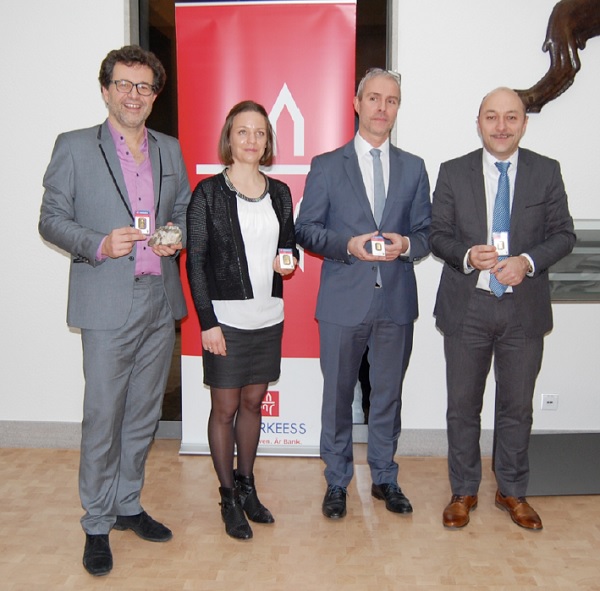
On Tuesday 13 December 2016, the Banque et Caisse d'Epargne de l'Etat (BCEE) officially launched the first gold ingot bearing the "Fairtrade" certification on the Luxembourg market; the ingots are in the form of 5 g and 10 g and are available from BCEE agencies.
The Fairtrade Lëtzebuerg NGO has welcomed this initiative to support small artisanal miners. Jean-Louis Zeien, President of Fairtrade Lëtzebuerg, explained "Gold mining throughout the world is often related to human rights violations and the destruction of the environment. The extraction of gold under conditions of fair trade aims to improve the living and working conditions of miners and means better protection of humans and the environment in the artisanal mining environment. Thus, we welcome the initiative of BCEE, the first bank from the Luxembourg financial centre to offer its customers Fairtrade-labelled gold ingots. This gesture of support for small artisanal miners symbolises the respect and valorisation of their hard work. The impact in the South of such a decision is considerable: in addition to a Fairtrade price, miners and the whole community will benefit from projects that can be realised with €18,800 of Fairtrade premiums generated by the purchase of 10 kg Of fair trade gold."
Indeed, more than 100 million people throughout the world depend directly or indirectly on artisanal and small-scale mines. Miners, most of whom are inadequately organised, often work illegally and without safety measures, such as the use of toxic products. These workers and their families are often in a precarious financial situation. In municipalities that depend on mining, there is often no drinking water or basic sanitary facilities. Housing is generally very simple and the population has only limited or no access to schooling or medical care.
Fairtrade Gold is the way to ensure a better future for miners, their families and their communities. Thanks to the regrouping in legal gold organisations, the miners can strengthen their position. The Fairtrade standard prohibits child labour, forced labour and other forms of discrimination. The certification includes protective clothing as well as health protection and accident prevention measures. In addition, Fairtrade certification involves equal opportunities, protection of the environment and transparency of commercial operations.
Fairtrade-certified mines receive, in addition to the guaranteed minimum price, a Fairtrade EPR of USD 2,000 per kilogram of gold. Members of the gold organisation decide democratically how these additional revenues are invested, e.g. in community projects (schools, water supply, medical centres, etc.) and improved operation of farms.
For the production of this first batch of gold ingots from the BCEE, it used 1kg of gold from the MACDESA mine in southern Peru. In addition to the perceived fair price, the Gold organisation will benefit from the Fairtrade premium generated. According to Santiago Ramirez Castro, responsible for compliance with the Standards within MACDESA: "Fairtrade certification allows us to sell our gold on better terms and invest in our community."
Compliance with Fairtrade standards during gold mining, as well as throughout the chain, is independently controlled by the certification body FLOCERT (accredited to ISO 17065). All stages of production, from extraction to jewellery or gold ingots, are therefore integrated into the Fairtrade system. Thus, flows of goods and cash can be traced transparently. In order for a final product to bear the Fairtrade label, it must be physically traceable.








